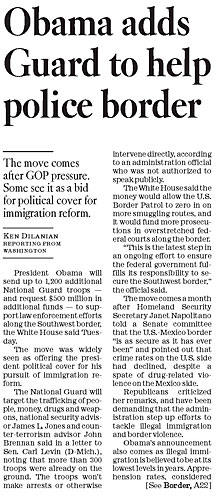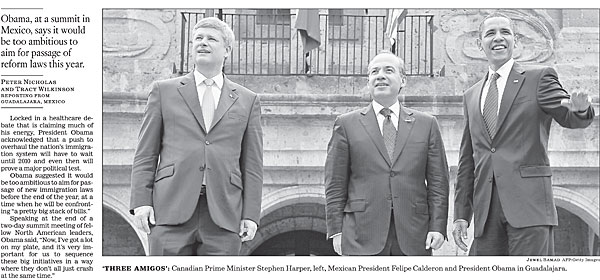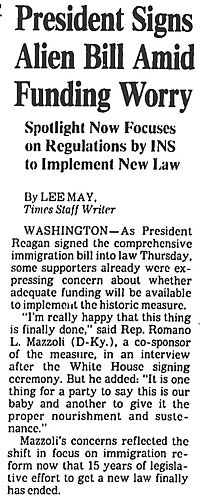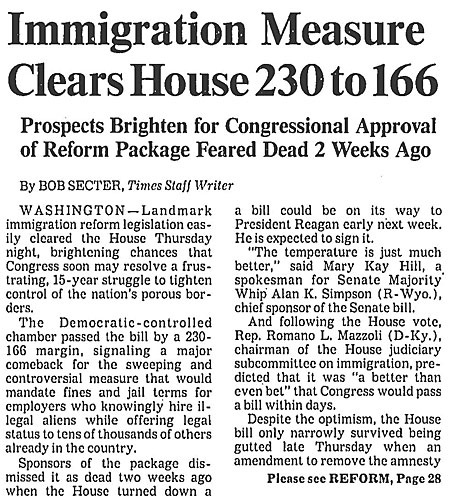U.S. immigration law: Decades of debate
All but dashing hopes of a push to pass immigration reform this year, Speaker John A. Boehner says it will be difficult to get any legislation approved in the Republican-controlled House. The move leaves reform advocates furious, nearly one week after Boehner outlined a set of principles on the issue at a GOP retreat.
The White House had hinted the administration might find room for compromise in the speaker’s outline, which included offering legal status to some of the 11 million people living in the U.S. without a path to citizenship. But conservatives in the speaker’s own party had harsh criticism for Boehner’s proposal, many slamming it as “amnesty.”
At a retreat for House Republicans, Speaker John A. Boehner unveils a set of principles for moving forward on immigration reform. The guidelines include the possibility of legalization for the 11 million people in the country without legal status after taking steps to secure the border.
A week later, conservative Republicans voice doubt about tackling the issue during an election year.
After the government shutdown ends, President Obama renews his pitch to pass immigration reform, calling on House Republicans to support the Senate bill. “Good policy is good politics in this instance,” Obama says, telling the GOP majority to “take a closer look at the polls.” But prospects appear dim, with key Republican leaders left upset by Obama’s unwillingness to negotiate with Speaker John A. Boehner during the budget standoff.
Two key House Republicans pull out of a bipartisan group overseeing a framework for immigration reform, saying they could not trust President Obama’s administration to enforce any measures Congress might pass. Reps. John Carter (R-Texas) and Sam Johnson (R-Texas), leave the group effectively defunct, saying they now favor a piecemeal approach.
House Republicans offer a more limited approach to immigration reform, floating a plan that would offer a path to citizenship only to those brought into the country as children. But the GOP proposal fails to make inroads with Democratic leaders who said they would back a bill that includes a pathway for all.
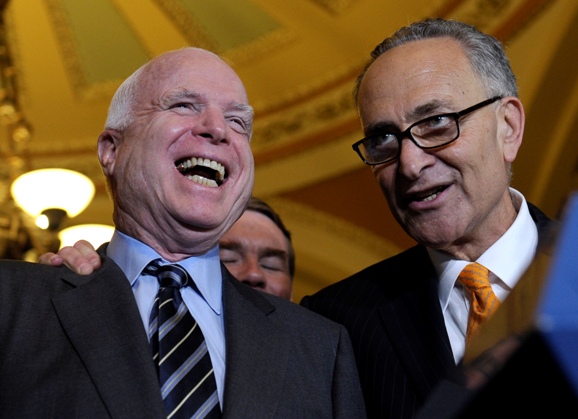
The Senate passes comprehensive immigration legislation with support from both parties, but the effort continues to face hurdles in the House where conservative Republicans oppose the package. President Obama describes the legislation as “common-sense reform” and called on “Congress to finish the job.”
The bill was approved 68 to 32. But despite the inclusion of a $46-billion border security deal to win over Republicans, the measure fell two votes shy of the authors’ original goal of winning the backing of 70 senators. Although some GOP leaders in the House, including Rep. Paul Ryan (R-Wis.), urge reform, many House Republicans are critical of the provision that affords a path to citizenship, calling it amnesty.
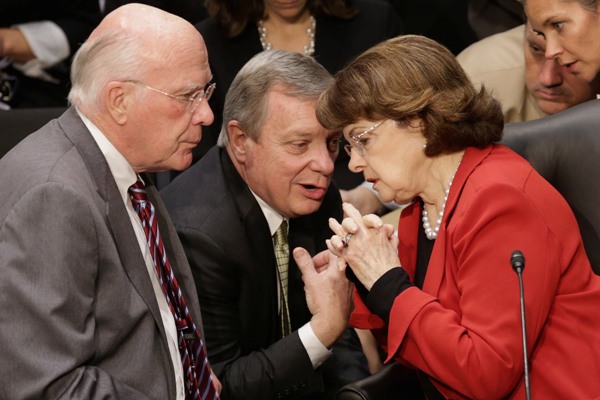
The Senate Judiciary Committee approves a bipartisan plan to revamp the U.S. immigration system, setting the proposal on course for weeks of debate, as some Democrats and Republicans aim to dismantle some of its provisions.
The legislation, approved 13 to 5, calls for a $4.5-billion increase in border security and contains a 13-year path to citizenship for some of the 11 million people in the United States without legal status. The bill also creates a low-skilled guest-worker program and would require businesses to verify the legal status of their employees within five years.
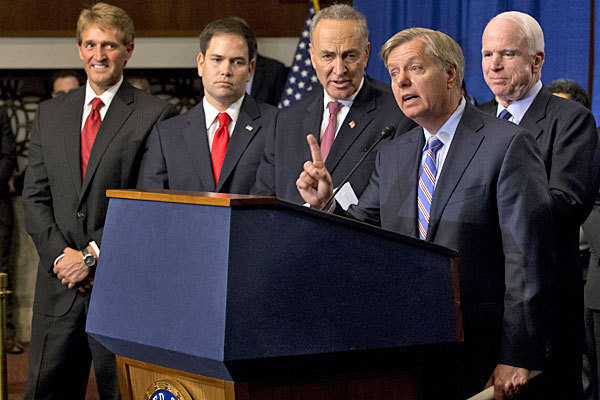
A bipartisan group of House lawmakers reaches an “agreement in principle” on a sweeping immigration bill that would parallel work underway in the Senate.
The House bill is expected to be more conservative than the bipartisan Senate measure, but it will include a similar political trade-off of border security measures alongside a path to citizenship for the estimated 11 million people who have entered the country illegally or overstayed their visas.
But House members appear to have been unable to reach agreement on a new guest-worker program for low-skilled employees, a central element to the Senate bill.
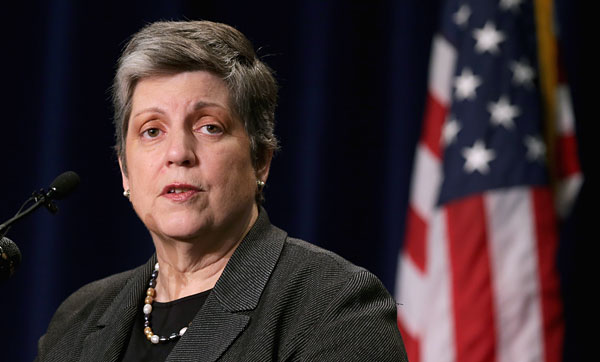
On the third day of hearings on a bill to overhaul the immigration system, senators take a break from partisan sniping and grill Homeland Security Secretary Janet Napolitano on whether the Boston Marathon bombings had exposed shortcomings in the nation’s immigration security apparatus.
Conservative Republicans have tried to slow the Senate bill since two brothers, ethnic Chechens granted political asylum from Russia as minors with their family, were identified as the suspects in the Boston bombings.
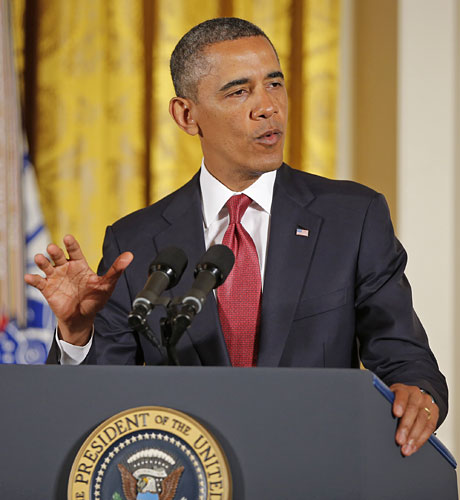
President Obama says the immigration legislation drafted by a bipartisan group of senators is “largely consistent” with the principles he has laid out, and he pledges his support to help pass comprehensive reform.
“This bill is clearly a compromise,” Obama says in a statement, “and no one will get everything they wanted, including me.”
The proposal “is largely consistent with the principles that I have repeatedly laid out for comprehensive reform,” the president says.
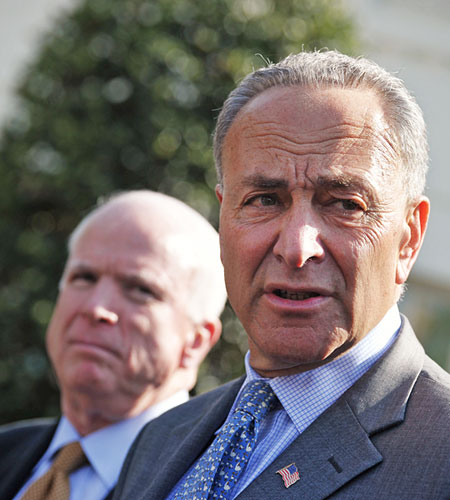
A bipartisan group of senators introduces a bill to overhaul immigration laws and provide a path to legal status for an estimated 11 million people who overstayed their visas or illegally entered the United States.
The far-reaching legislative package would tighten border security, increase visas for foreign workers and toughen penalties against American employers who hire undocumented workers.
Immigrants without legal status who have not committed a serious crime and meet other criteria would be able to obtain work permits and eventually apply to become permanent residents and U.S. citizens.
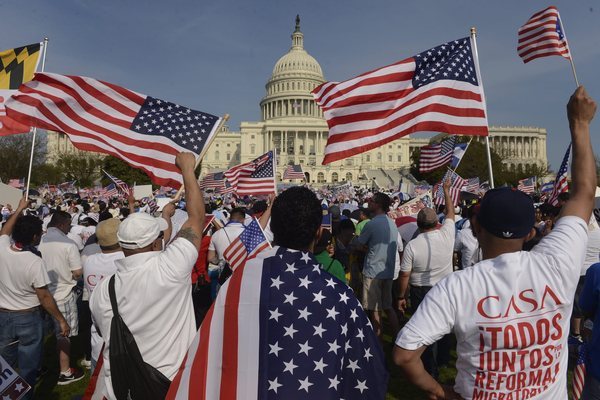
Thousands of immigration advocates gather outside the Capitol, many waving American flags, as a bipartisan group of senators push to finish a sweeping immigration bill.
The first draft of the bill is 1,000 pages, but the eight senators have yet to sign off on all its provisions. Disputes over agricultural workers and border security that had once appeared resolved remain in flux.
“We are closer now than we have been in 25 years for serious immigration reform,” Sen. Richard J. Durbin (D-Ill.) says after a briefing over sandwiches and chips with the Congressional Hispanic Caucus in the House. “This president is behind it. And there is a strong, growing bipartisan effort in the Senate to support it. We hope that the House will do the same.”
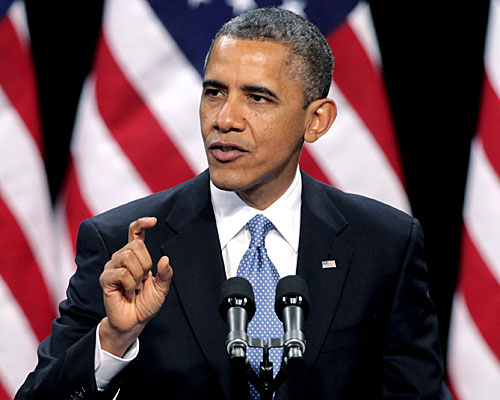
President Obama outlines his vision for reforming the nation’s immigration policy, calling for a clear path to citizenship for illegal residents who pay their taxes, learn English and abide by the law.
In a speech at a high school in Las Vegas, Obama urged his audience to keep the pressure on lawmakers to end the years-long deadlock on the issue and finally fix what he called a “broken” immigration system.
“This time, action must follow,” Obama told a cheering crowd at the Del Sol High School. “We’ve been debating this a very long time.”
Read the President’s immigration reform speech.
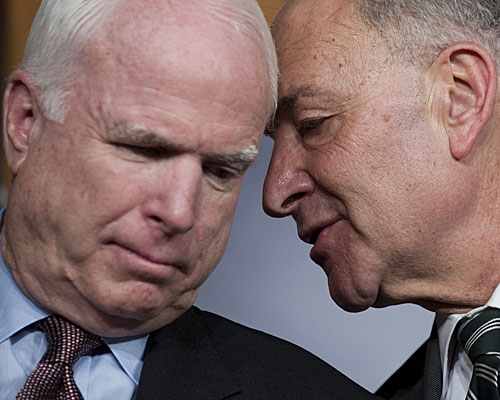
As they announce their framework for comprehensive immigration reform, leading senators from both parties declare that the politics of the long-stalled debate had shifted after Republican candidates failed to win significant support from the growing Latino electorate in November.
But many conservatives made clear they rejected that contention. They remain deeply skeptical of any plan that would create a way for the estimated 11 million illegal immigrants in the country to become citizens.
“The last time we talked about this in 2007, it sounded very seductive. When we saw the details, it was clear it wouldn’t work,” Sen. Jeff Sessions (R-Ala.) said. Sessions said he was concerned that the Obama administration was not committed to securing the borders to thwart illegal immigration.
A bipartisan group of senators has agreed on a plan to grant legal status to most of the estimated 11 million illegal immigrants in the U.S., which could form the basis for a far-reaching overhaul of immigration laws this year.
The Senate blueprint, drafted during weeks of closed-door meetings by leading senators from each party, will probably set parameters for a contentious legislative battle over the next several months. The eight senators involved intend to release their proposal publicly Monday.
The Senate plan is more conservative than President Obama’s proposal, which he plans to unveil Tuesday in a speech in Las Vegas. But its provisions for legalizing millions of undocumented immigrants go further than measures that failed to advance in Congress in previous years — a reminder of how swiftly the politics of immigration have shifted since Latino voters’ strong influence in the November election.
Traditional pillars of the Republican base, such as police groups, evangelical pastors and the U.S. Chamber of Commerce, have begun to push skeptical GOP lawmakers to change federal immigration laws to allow most of the nation’s 11 million illegal immigrants to apply for legal status.
The issue has long been fought mostly between Republicans and Democrats. But the fate of a potential immigration overhaul may be determined by battles erupting inside the GOP.
“Now it’s conservatives versus conservatives over how much immigration reform should happen,” said Alex Nowrasteh, an immigration expert at the Cato Institute, a libertarian think tank in Washington that has advanced a free-market argument for opening up the immigration system.
President Obama has vowed to revise immigration laws early in his second term, but Republican support would be necessary to pass any significant legislation in the GOP-held House.
Even as Republicans in the House and Senate begin efforts to pass narrow immigration bills in the lame-duck session, closed-door negotiations have begun over how to accomplish a much broader package of immigration reforms next year.
Three Republican senators introduce an alternative to the Dream Act that would give legal status to young immigrants brought to the U.S. unlawfully as children.
Later this week, the House is expected to vote on a bill that would increase the number of visas for technology jobs, while reducing other legal immigration.
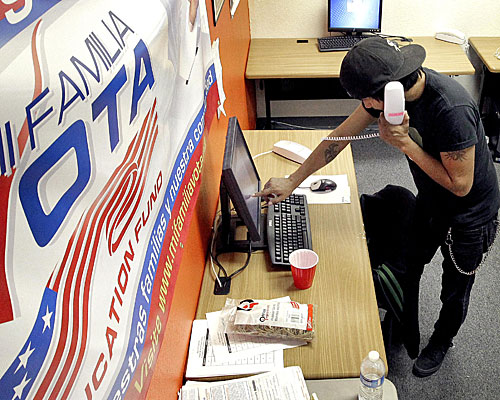
The outsized role that Latino voters played in securing victories for President Obama and Democratic Senate candidates has energized the effort to rewrite America’s immigration laws, but opposition in Congress, particularly among House Republicans, remains a significant hurdle.
In his election-night victory speech, President Obama specifically mentioned “fixing our immigration system” as a priority — along with reducing the deficit, reforming the tax system and reducing the country’s use of imported oil. Latino leaders made clear they planned to hold Obama to that, noting that the president had promised in his 2008 campaign to push for reform but did not deliver.
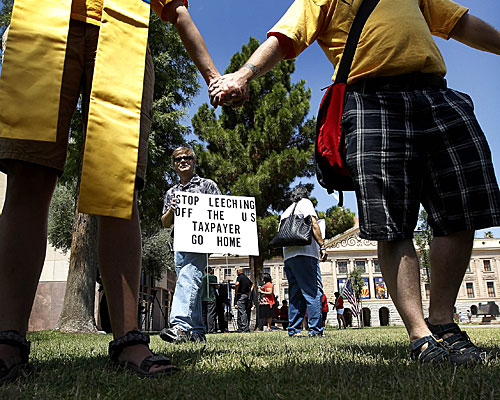
Striking down three key parts of Arizona’s crackdown on illegal immigrants and jeopardizing similar laws in five other states, the U.S. Supreme Court rules that the federal government, not states, holds responsibility for enforcing immigration laws.
The justices did clear the way for Arizona to begin enforcing another controversial part of its law, which directs police to check the immigration status of people they suspect are in the country illegally when they make lawful stops for other reasons. But the justices approved that provision only after attaching conditions that sharply limited its reach.
The invalidated provisions would have allowed Arizona authorities to arrest illegal immigrants for looking for work or for not carrying registration documents. Justices also voided a provision authorizing police to arrest immigrants for crimes that might justify deportation.
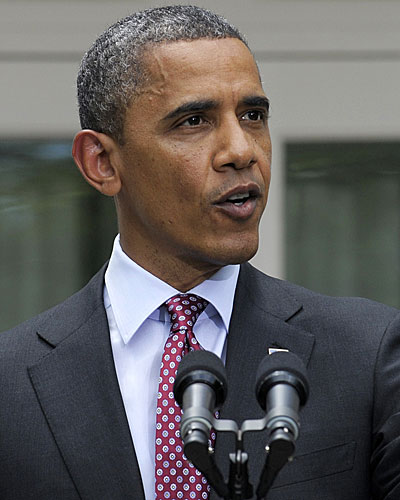
Using his executive powers to go where Congress would not, President Obama delivers on a promise and orders his administration to stop deporting illegal immigrants who came to the U.S. as children, a shift that could affect more than 1 million people.
The new policy allows younger immigrants to apply for a two-year renewable reprieve on deportation, providing they have no criminal record. It is unlikely to settle the nation’s bitter debate over immigration, but may be pivotal in the battle for Latino voters in the presidential campaign.
Appearing in the Rose Garden, Obama said his executive order did not provide amnesty, immunity or a path to citizenship. But he said a “temporary, stop-gap measure” was necessary because Congress had failed to pass a comprehensive immigration overhaul, as he had sought.

A last-ditch Democratic effort to establish a path to citizenship for some children of illegal immigrants fails in the Senate, likely derailing any attempt at sweeping immigration reform in Congress for the foreseeable future.
The bill, known as the Dream Act, had passed the House, and its advocates and Democratic sponsors hoped that they could muster enough Republican votes to bring the legislation to the floor. Instead, it fell victim to a GOP filibuster, one in which a handful of Democrats also blocked the bill. The final tally was 55 to 41.
The Obama administration launches its long-expected legal attack on Arizona’s strict new immigration law Tuesday, arguing that only Washington could set the nation’s rules for arresting illegal immigrants.
The government said that its immigration enforcement policy “targets … dangerous aliens,” including violent criminals, gang members, drug traffickers and others “who pose a danger to the national security and a risk to public safety,” whereas the Arizona law would force federal officials to cope with a flood of illegal immigrants who pose no danger.
President Obama will send up to 1,200 additional National Guard troops — and request $500 million in additional funds — to support law enforcement efforts along the Southwest border, the White House said.
The move was widely seen as offering the president political cover for his pursuit of immigration reform.
The National Guard will target the trafficking of people, money, drugs and weapons, national security advisor James L. Jones and counterterrorism advisor John Brennan said in a letter to Sen. Carl Levin (D-Mich.), noting that more than 300 troops were already on the ground. The troops won’t make arrests or otherwise intervene directly, according to an administration official who was not authorized to speak publicly.
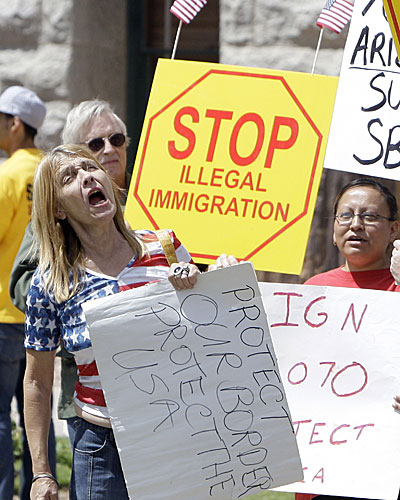
Arizona Gov. Jan Brewer signs the toughest law against illegal immigration in the country, shrugging aside warnings from religious and civil rights leaders — and President Obama — that it would lead to widespread racial profiling.
Hours after Obama denounced the measure as “misguided,” Brewer held a signing ceremony for the bill, which makes it a state crime to be in Arizona illegally and requires police to check suspects for immigration paperwork.
Obama signaled that a legal showdown might be possible and that his administration would “examine the civil rights and other implications” of the law. Immigrant rights groups have vowed a court fight, arguing that regulating immigration is a federal matter.
Locked in a healthcare debate that is claiming much of his energy, President Obama acknowledges that a push to overhaul the nation’s immigration system will have to wait until 2010 and even then will prove a major political test.
Speaking at the end of a two-day summit meeting of fellow North American leaders, Obama said, “Now, I’ve got a lot on my plate, and it’s very important for us to sequence these big initiatives in a way where they don’t all just crash at the same time.”
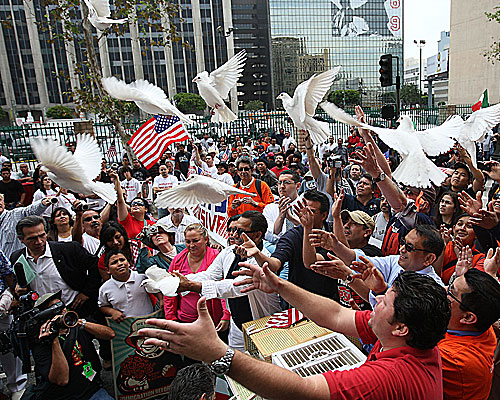
Waving American flags and pictures of President Obama, thousands of protesters take to the streets in May Day rallies in Southern California to promote immigration reform.
Marchers said they were encouraged by Obama’s support for change and his pledge this week to begin laying the groundwork for legislation that would include a path to legalization for the nation’s estimated 12 million illegal immigrants.
The protests attracted small but jovial crowds who wore T-shirts that said “Legalize America Now” and held signs that said, “Obama, Escucha” — “Obama, Listen.”
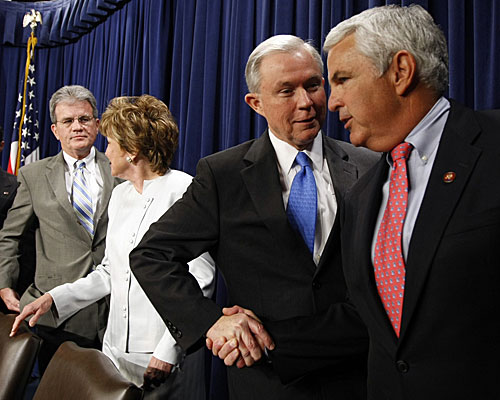
The Senate resoundingly defeats a bill that would have overhauled the nation’s immigration laws for the first time in two decades, crushing the chances of settling the contentious matter in the next few years.
The 46-53 rout was 14 votes short of the 60 needed to end the debate and move the bill forward. It was a major defeat for President Bush, who had pushed hard to achieve his last major domestic initiative. It was also a bitter finale for the bipartisan team of senators and two Cabinet secretaries who worked for months to craft the intricate bill.
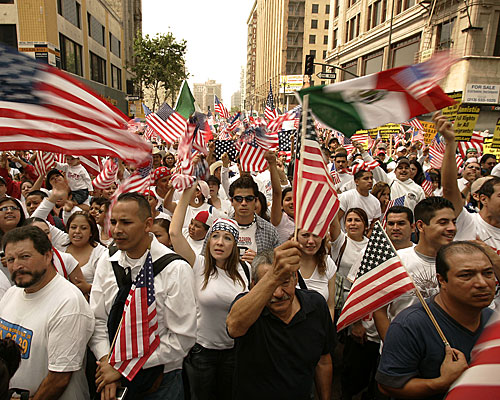
Feeling power in their numbers, hundreds of thousands of people marched peacefully, even joyously, through the streets of Los Angeles as part of a nationwide demonstration of economic and political clout by immigrants — legal and illegal.
Thousands of businesses were shuttered on the “Day Without Immigrants” as workers and their families, most of them from Mexico, participated in a boycott of work and commerce, rallying to demonstrate their importance to the U.S. economy and to demand changes in immigration law that would give illegal migrants a path to citizenship.

President Bush’s immigration reform proposal would allow millions of illegal immigrants to apply for temporary work permits, but they would receive “no special advantage” in obtaining green cards that confer permanent U.S. residence, administration officials.

Capping years of frustration, the House votes to overhaul the beleaguered Immigration and Naturalization Service, splitting up its law enforcement and service roles into separate bureaus within the Justice Department.
The bill passes, 405 to 9, reflecting overwhelming support to straighten out an agency that has become legendary for bureaucratic incompetence, most recently when it notified a Florida flight school that two of the Sept. 11 terrorists had been approved for U.S. visas — six months after they attacked the World Trade Center.
The U.S.-Mexican effort to overhaul immigration policy is now focusing on ways to allow large numbers of temporary guest workers into the United States to meet the demands of restaurants, hotels, healthcare and other service industries that are starved for employees, according to U.S. government officials and observers familiar with the ongoing negotiations.
Under the proposed approach, a broader array of U.S. industries would be able to sponsor foreign laborers, who then could enter the United States with temporary visas to fill specific jobs. Current programs for temporary workers largely have been limited to agriculture and high-technology.
Secretary of State Colin L. Powell and Atty. Gen. John Ashcroft meet at the State Department with Mexican Foreign Secretary Jorge Castaneda and Interior Secretary Santiago Creel to begin drafting a migration policy for the new administrations in Washington and Mexico City.
U.S. officials said both governments hope to produce ideas that President Bush and Mexican President Vicente Fox can discuss when they meet April 20-22 at a Western Hemisphere summit in Quebec City.
With Congress nearing adjournment, a final burst of negotiations has produced only modest deals to ease immigration restrictions.
Legislation that would have provided a ‘mini-amnesty’ to as many as 500,000 immigrants who entered the country before 1986 and would have helped hundreds of thousands of others from Central America and Haiti gain permanent residency fails to gain passage.
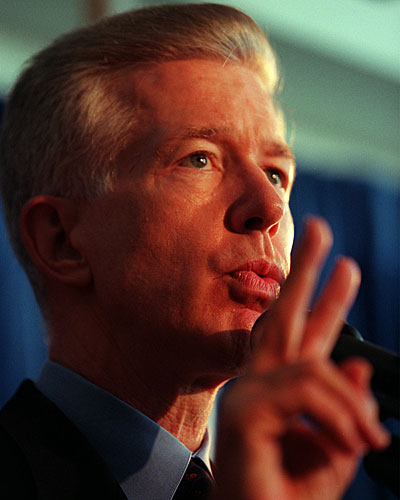
Attorneys for Gov. Gray Davis and civil rights organizations reach an agreement to end the litigation surrounding Proposition 187, effectively killing the landmark 1994 ballot referendum that targeted illegal immigrants and became a pivotal juncture in California’s political life.
Davis agreed not to appeal an earlier federal court ruling that held much of the initiative to be unconstitutional. The agreement almost certainly will prevent the case from going to the U.S. Supreme Court, said lawyers on both sides of the case.
Democratic leaders introduce legislation to speed the naturalization process, even as two congressional committees conduct hearings on bills intended to tighten up the process.
Kicking off an election-year effort aimed at attracting Latino voters, Sen. Edward M. Kennedy (D-Mass.) and House Minority Leader Richard A. Gephardt (D-Mo.) offer bills to, among other things, limit the Immigration and Naturalization Service’s authority to increase fees until it reduces by 30% the backlog of 1.7 million citizenship applications — one quarter of them in Southern California.
Republican congressional leaders strike a deal with the White House on toning down hotly contested immigration reforms, leading to House passage of a measure that aims to tighten access at the nation’s borders and impose stricter penalties on those who arrive here illegally.
The bill, which would make the most sweeping changes to the nation’s immigration laws in a decade, had become snagged when President Clinton objected to proposals targeting legal immigrants. Rather than see the whole bill scuttled over this issue, GOP leaders yielded to his demands that they either delete or soften those provisions.
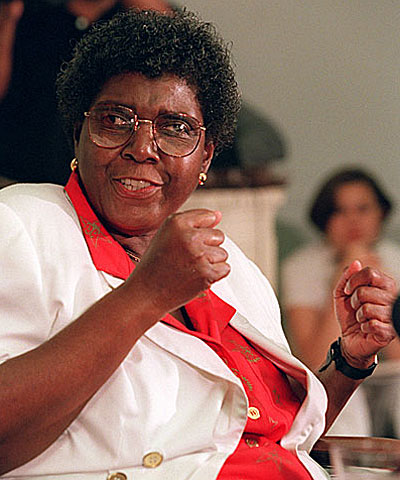
Efforts in Congress to limit the flow of foreigners into the United States get a boost when a bipartisan federal commission says that the number of immigrants admitted to the country should be cut and that it should be more difficult for their extended families to join them once they are here.
The White House immediately signaled its support for the far-reaching proposals.
The commission, headed by former Rep. Barbara Jordan (D-Texas), urged Congress to pass legislation that would reduce the annual ceiling on legal immigrants by about one-third, from the 800,000 admitted in 1994 to 550,000 in several years.
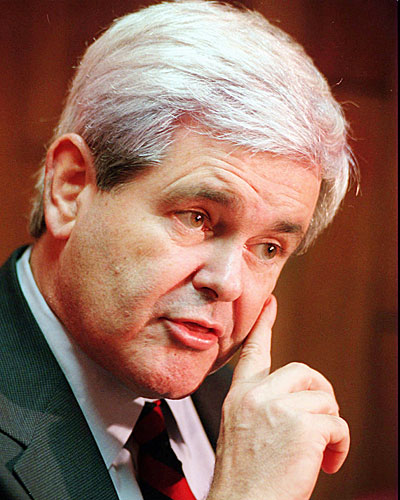
Vowing a crackdown on illegal immigration, House Speaker Newt Gingrich (R-Ga.) says he wants his new task force on immigration reform to prepare comprehensive recommendations by the end of June.
Participants said the group intends to consider a broad range of strategies — from tougher enforcement at the borders to a counterfeit-proof identification card. It plans a trip to the Mexican border and hearings with mayors and governors in affected regions.
Although the effort will not begin in earnest until after the Republicans complete work on their “contract with America” in the next month, Gingrich said he expects “very bold reform” to move through the House no later than September.
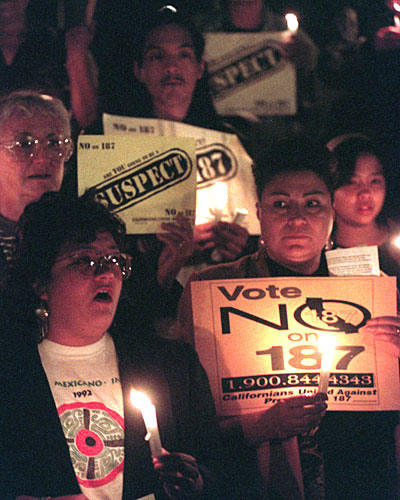
California’s Proposition 187, the emotion-sparking ballot initiative that aims to cut off free social benefits and education to illegal immigrants, sweeps to victory. Republican Gov. Pete Wilson and other Republicans had made Proposition 187 the centerpiece of their campaigns down the final stretch in October.
A respected, bipartisan federal commission issues a sweeping blueprint for reform of immigration policy, calling for cutting off most public benefits to illegal immigrants, creating a much-disputed computerized registry for job eligibility and making it tougher to illegally cross the border.
“If a person is here unlawfully, he should be entitled to no benefits,” said former Texas congresswoman Barbara Jordan, chairwoman of the U.S. Commission on Immigration Reform.
President Reagan signs into law the Immigration Reform and Control Act. Considered to be the most sweeping reform in more than 30 years, the legislation offers legal residency to most illegal immigrants who have resided continuously in the United States since before Jan. 1, 1982.
At the signing, President Reagan expresses hope that the measure will preserve “one of the most sacred possessions of our people — American citizenship.”
Landmark immigration reform legislation easily clears the House, brightening chances that Congress soon may resolve a frustrating, 15-year struggle to tighten control of the nation’s porous borders.
The Democratic-controlled chamber passes the bill by a 230-166 margin, signaling a major comeback for the sweeping and controversial measure that would mandate fines and jail terms for employers who knowingly hire illegal aliens while offering legal status to tens of thousands of others already in the country.
Sources: Times research
Credits: Maloy Moore, Mark McGonigle, TimelineSetter

